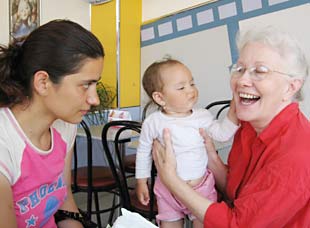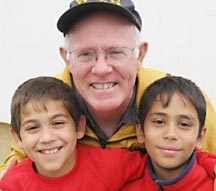Updated: 12/01/06
| John and Phyllis Carrier, along with Buckner international program director Randy Daniels, spend time with a foster care group home in Tarneveni, Romania. |
Romanian child-development
center fits couple well
By Jenny Pope
Buckner
John and Phyllis Carrier of Wilshire Baptist Church in Dallas are both over 60. They’re retired, in good health, and part of an army of seniors looking to make a difference by offering their time and years of professional experience to do some good.
The Carriers, both former educators and international travelers, found a perfect fit when they volunteered as educational consultants for Buckner in Romania. For three months, they helped research and develop a detailed plan for construction and operation of a child development center in the gypsy-populated region of Tarneveni.
 |
| Phyllis Carrier comforts a mother and child during her long-term missions stay with Buckner in Romania. |
“We’re different from normal mission trip volunteers,” Mrs. Carrier said. “We’re not working, we don’t have any family obligations, and we have the health and money and opportunity to travel. So we thought, ‘Why not go and stay longer than the normal mission trip?’”
Her husband, who had a 27-year career as a college professor and university president, said it was an honor to work with Buckner and use his skills to help “save people’s lives.”
Randy Daniels, Buckner international program operations director, said that with only three staff members in Romania, the Carriers’ time and expertise was invaluable in determining whether the timing was right for Buckner to move into Romania and start a school.
“We hope to recruit more volunteers like John and Phyllis—professionals who have retired but aren’t ready to quit. Their knowledge gives Buckner more eyes, more ears and more hands around the world, which ultimately means we can better serve more children,” he said.
During their three-month stay in Targu Mures and Tarneveni, the Carriers conducted field research and met with more than 20 Romanian government officials, UNICEF workers, school administrators, church leaders, health professionals and non-governmental organizations. What they discovered was a cry for help from country’s overwhelming and routinely ignored Gypsy community, also known as Roma.
 |
| John Carrier, a senior long-term missions volunteer with Buckner, hugs two Romanian orphan |
“The Gypsy community is highly discriminated against in Romanian culture,” Carrier said. “They’re segregated, living in abandoned apartment buildings and shacks made of dirt and scrap pieces of wood and metal. They speak a different language. They beg on the streets. Few are educated and about 75 percent are unemployed.”
About 6 million people—25 percent of the Romanian population—is below the national poverty line, Carrier noted. The Tarneveni community, with a known population of 35,000 people, is surrounded by three Gypsy villages of about 6,000 people each.
“When the communist government failed, their safety net collapsed,” Carrier explained. “Factories closed; hospitals and schools closed. Suddenly public housing is private, and they’re left without jobs. Thousands of children are abandoned each year in this community, and thousands of Gypsy people have no birth registration.”
During the past seven years, Romania has worked to reform its orphanage system in order to enter the European Economic Union after experiencing international scrutiny for despondent orphanage conditions following the fall of communism.
Today, a majority of orphan children live in foster families or group homes and receive traditional education. Buckner supports dozens of these homes in Mures County, Romania.
However, Gypsy children still living with their families receive little social services support and usually do not attend public school because they are so behind in social and language skills, Carrier said.
“This is why the proposed child development center will make such an impact,” he explained.
“What Buckner is planning to do is a major step forward in Romania. They’re going into a community which is a vacuum of public services and offering to help supplement what the government is trying to do. What these people really need is love and care and help.”
The proposed child development center will care for children ages 3-4, and provide additional support services to them and their families, including humanitarian aid, health care, counseling and spiritual development.
“Our hope is that we can help prepare these children to enter the public school system at the age of 6,” Mrs. Carrier said. “These first years are instrumental in preparing them for a future.”
The Carriers’ dream of returning to Romania, or elsewhere if needed, and laying the framework for other retired seniors to follow in their footsteps.
“We hope that we can show others that people of goodwill can do this and be safe,” Carrier said.
















We seek to connect God’s story and God’s people around the world. To learn more about God’s story, click here.
Send comments and feedback to Eric Black, our editor. For comments to be published, please specify “letter to the editor.” Maximum length for publication is 300 words.